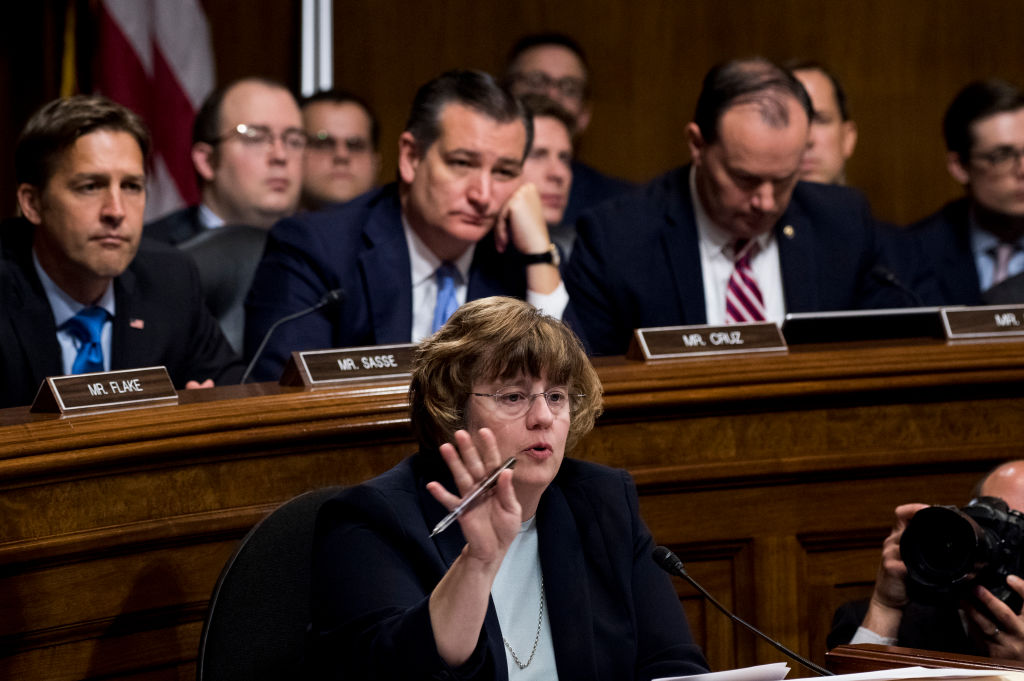Prosecutor hired by Senate Republicans explains why she wouldn't prosecute Brett Kavanaugh


A free daily email with the biggest news stories of the day – and the best features from TheWeek.com
You are now subscribed
Your newsletter sign-up was successful
On Sunday night, the Arizona prosecutor who questioned Christine Blasey Ford on Thursday on behalf of the Senate Judiciary Committee's all-male Republican majority sent Senate Republicans a five-page memo laying out why Ford's sexual assault allegations against Supreme Court nominee Brett Kavanaugh don't meet her standards for criminal prosecution.
"A 'he said, she said' case is incredibly difficult to prove," prosecutor Rachel Mitchell wrote. "But this case is even weaker than that," because "Dr. Ford identified other witnesses to the event, and those witnesses either refuted her allegations or failed to corroborate them." Mitchell, a registered Republican, pointed to what she called holes in Ford's memory, especially how she got home from the house party in 1982. "Her inability to remember this detail raises significant questions," Mitchell argued. "There is no clear standard of proof for allegations made during the Senate's confirmation process," she added. "But the world in which I work is the legal world, not the political world."
Mitchell's memo, which "is likely to prompt significant pushback from Democratic senators," doesn't go into her brief questioning of Kavanaugh, truncated by the GOP senators taking over, The Washington Post reports. "But the memo is clearly aimed at assuaging the concerns of a handful of GOP senators who are on the fence about whether to vote to confirm Kavanaugh and are considering whose story — Ford's or Kavanaugh's — to believe." In her testimony, Ford, a psychology professor, said she is "100 percent" certain that Kavanaugh pinned her on a bed, tried to remove her clothes, and covered her mouth when she tried to yell for help.
The Week
Escape your echo chamber. Get the facts behind the news, plus analysis from multiple perspectives.

Sign up for The Week's Free Newsletters
From our morning news briefing to a weekly Good News Newsletter, get the best of The Week delivered directly to your inbox.
From our morning news briefing to a weekly Good News Newsletter, get the best of The Week delivered directly to your inbox.
A free daily email with the biggest news stories of the day – and the best features from TheWeek.com
Peter has worked as a news and culture writer and editor at The Week since the site's launch in 2008. He covers politics, world affairs, religion and cultural currents. His journalism career began as a copy editor at a financial newswire and has included editorial positions at The New York Times Magazine, Facts on File, and Oregon State University.
-
 The broken water companies failing England and Wales
The broken water companies failing England and WalesExplainer With rising bills, deteriorating river health and a lack of investment, regulators face an uphill battle to stabilise the industry
-
 A thrilling foodie city in northern Japan
A thrilling foodie city in northern JapanThe Week Recommends The food scene here is ‘unspoilt’ and ‘fun’
-
 Are AI bots conspiring against us?
Are AI bots conspiring against us?Talking Point Moltbook, the AI social network where humans are banned, may be the tip of the iceberg
-
 Judge blocks Hegseth from punishing Kelly over video
Judge blocks Hegseth from punishing Kelly over videoSpeed Read Defense Secretary Pete Hegseth pushed for the senator to be demoted over a video in which he reminds military officials they should refuse illegal orders
-
 Trump’s EPA kills legal basis for federal climate policy
Trump’s EPA kills legal basis for federal climate policySpeed Read The government’s authority to regulate several planet-warming pollutants has been repealed
-
 House votes to end Trump’s Canada tariffs
House votes to end Trump’s Canada tariffsSpeed Read Six Republicans joined with Democrats to repeal the president’s tariffs
-
 Bondi, Democrats clash over Epstein in hearing
Bondi, Democrats clash over Epstein in hearingSpeed Read Attorney General Pam Bondi ignored survivors of convicted sex offender Jeffrey Epstein and demanded that Democrats apologize to Trump
-
 El Paso airspace closure tied to FAA-Pentagon standoff
El Paso airspace closure tied to FAA-Pentagon standoffSpeed Read The closure in the Texas border city stemmed from disagreements between the Federal Aviation Administration and Pentagon officials over drone-related tests
-
 Judge blocks Trump suit for Michigan voter rolls
Judge blocks Trump suit for Michigan voter rollsSpeed Read A Trump-appointed federal judge rejected the administration’s demand for voters’ personal data
-
 US to send 200 troops to Nigeria to train army
US to send 200 troops to Nigeria to train armySpeed Read Trump has accused the West African government of failing to protect Christians from terrorist attacks
-
 Grand jury rejects charging 6 Democrats for ‘orders’ video
Grand jury rejects charging 6 Democrats for ‘orders’ videoSpeed Read The jury refused to indict Democratic lawmakers for a video in which they urged military members to resist illegal orders
